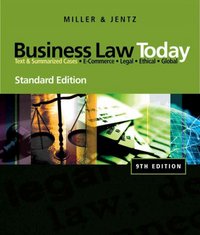Holder in Due Course. Robert Triffi n bought a number of dishonored checks from McCalls Liquor Corp.,
Question:
Holder in Due Course. Robert Triffi n bought a number of dishonored checks from McCall’s Liquor Corp., Community Check Cashing II, LLC (CCC), and other licensed checkcashing businesses in New Jersey. Seventeen of the checks had been dishonored as counterfeit. In an attempt to recover on the items, Triffi n met with the drawer, Automatic Data Processing, Inc. (ADP). At the meeting, Triffi n said that he knew the checks were counterfeit. When ADP refused to pay, Triffi n fi led suits in New Jersey state courts to collect, asserting claims totaling
$11,021.33. With each complaint were copies of assignment agreements corresponding to each check. Each agreement stated, among other things, that the seller was a holder in due course (HDC) and had assigned its rights in the check to Triffi n. ADP had not previously seen these agreements. A private investigator determined that the forms attached to the McCall’s and CCC checks had not been signed by their sellers but that Triffi n had scanned the signatures into his computer and pasted them onto the agreements. ADP claimed fraud. Does Triffi n qualify as an HDC? If not, did he acquire the rights of an HDC under the shelter principle? As for the fraud claim, which element of fraud would ADP be least likely to prove? [Triffi n v.
Automatic Data Processing, Inc., 394 N.J.Super. 237, 926 A.2d 362 (App.Div. 2007)]
18 –6 Case Problem with Sample Answer American International Group, Inc. (AIG), an insurance company, issued a check to Jermielem Merriwether in connection with a personal-injury matter. Merriwether presented the check to A-1 Check Cashing Emporium (A-1) for payment. A-1’s clerk forgot to have Merriwether sign the check. When he could not reach Merriwether and ask him to come back to A-1 to sign the check, the clerk printed Merriwether’s name on the back and deposited it for collection. When the check was not paid, A-1 sold it to Robert Triffi n, who is in the business of buying dishonored checks. When Triffi n could not get the check honored, he sued AIG, contending that he, through A-1, had the right to collect on the check as a holder in due course (HDC).
The trial court rejected that claim. Triffi n appealed. On what basis could he claim HDC status? [Triffi n v. American International Group, Inc., __ A.2d __ (N.J.Super. 2008)]
—After you have answered Problem 18–6, compare your answer with the sample answer given on the Web site that accompanies this text. Go to www.cengage.com/blaw/blt, select “Chapter 18,” and click on “Case Problem with Sample Answer.”
Step by Step Answer:






